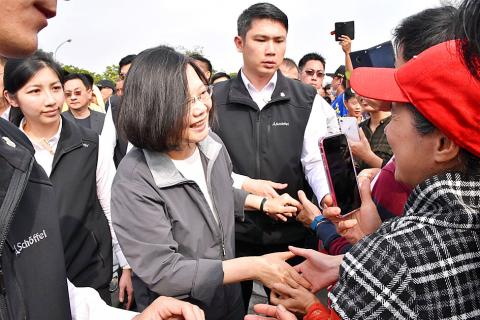President Tsai-Ing-wen (蔡英文) yesterday confirmed that she would run for re-election next year to complete her vision for the nation.
“It’s natural that any sitting president wants to do more for the country and wants to finish things on his or her agenda,” Tsai said in an interview with CNN’s Matt Rivers aboard the presidential plane, when asked about her plans for next year’s presidential election.
Asked if that means she would seek re-election, Tsai nodded and said: “Yes, yes.”

Photo: Huang Shu-li, Taipei Times
The interview took place on Monday, the Presidential Office said.
Tsai said she was confident about her prospects, adding that it is “something I have prepared for.”
However, she is also aware of the challenges ahead.
“It’s again another challenge. Being president, you’re not short of challenges. At good times you have challenges of one sort, and in bad times you have challenges of another sort,” said Tsai, whose approval rating remains below 40 percent.
In November last year, Tsai’s Democratic Progressive Party (DPP) suffered heavy losses in elections for local government leaders, which many saw as a referendum on her leadership and her administration’s performance.
Tsai stepped down as party chairperson to take responsibility for the losses. Senior pro-Taiwan independence advocates have urged her not to run for re-election amid concerns that this could pave the way for the China-leaning Chinese Nationalist Party (KMT) to retake power.
The Presidential Office yesterday said that Tsai’s primary purpose for accepting the interview with CNN was to give Taiwan a voice through an international media outlet.
During the interview, she discussed the current international situation, spoke about why she believes Taiwan will play an increasingly crucial role in global affairs and elaborated on cross-strait relations, the office said.
Presidential Office spokesman Xavier Chang (張惇涵) said Tsai became an “endorser” for Taiwan during the interview, taking CNN’s correspondent to Taipei’s Ximending (西門町) area to taste traditional Taiwanese dishes, such as pork chops with rice and chicken thighs.
Through the interview, Tsai hoped to show the world the different aspects — both traditional and modern — of Taiwan, he added.

‘WIN-WIN’: The Philippines, and central and eastern European countries are important potential drone cooperation partners, Minister of Foreign Affairs Lin Chia-lung said Minister of Foreign Affairs Lin Chia-lung (林佳龍) in an interview published yesterday confirmed that there are joint ventures between Taiwan and Poland in the drone industry. Lin made the remark in an exclusive interview with the Chinese-language Liberty Times (the Taipei Times’ sister paper). The government-backed Taiwan Excellence Drone International Business Opportunities Alliance and the Polish Chamber of Unmanned Systems on Wednesday last week signed a memorandum of understanding in Poland to develop a “non-China” supply chain for drones and work together on key technologies. Asked if Taiwan prioritized Poland among central and eastern European countries in drone collaboration, Lin

The Chien Feng IV (勁蜂, Mighty Hornet) loitering munition is on track to enter flight tests next month in connection with potential adoption by Taiwanese and US armed forces, a government source said yesterday. The kamikaze drone, which boasts a range of 1,000km, debuted at the Taipei Aerospace and Defense Technology Exhibition in September, the official said on condition of anonymity. The Chungshan Institute of Science and Technology and US-based Kratos Defense jointly developed the platform by leveraging the engine and airframe of the latter’s MQM-178 Firejet target drone, they said. The uncrewed aerial vehicle is designed to utilize an artificial intelligence computer

Renewed border fighting between Thailand and Cambodia showed no signs of abating yesterday, leaving hundreds of thousands of displaced people in both countries living in strained conditions as more flooded into temporary shelters. Reporters on the Thai side of the border heard sounds of outgoing, indirect fire yesterday. About 400,000 people have been evacuated from affected areas in Thailand and about 700 schools closed while fighting was ongoing in four border provinces, said Thai Rear Admiral Surasant Kongsiri, a spokesman for the military. Cambodia evacuated more than 127,000 villagers and closed hundreds of schools, the Thai Ministry of Defense said. Thailand’s military announced that

CABINET APPROVAL: People seeking assisted reproduction must be assessed to determine whether they would be adequate parents, the planned changes say Proposed amendments to the Assisted Reproduction Act (人工生殖法) advanced yesterday by the Executive Yuan would grant married lesbian couples and single women access to legal assisted reproductive services. The proposed revisions are “based on the fundamental principle of respecting women’s reproductive autonomy,” Cabinet spokesperson Michelle Lee (李慧芝) quoted Vice Premier Cheng Li-chiun (鄭麗君), who presided over a Cabinet meeting earlier yesterday, as saying at the briefing. The draft amendment would be submitted to the legislature for review. The Ministry of Health and Welfare, which proposed the amendments, said that experts on children’s rights, gender equality, law and medicine attended cross-disciplinary meetings, adding that